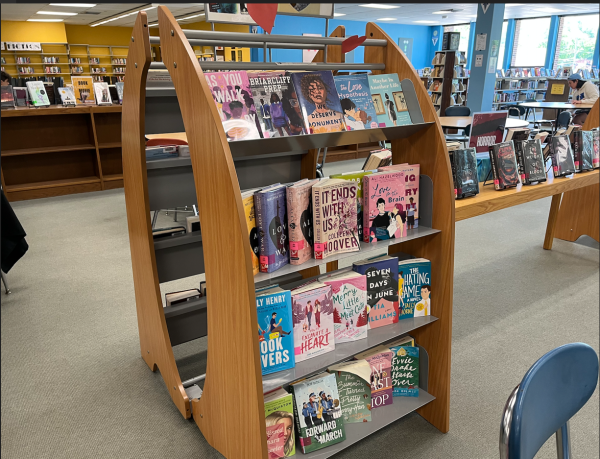
(Mary Curley)
A few months ago I was in Barnes and Nobles, when I saw something different. In the open aisle where tables stand, usually separating books based on genre, was a slightly large black table. Maybe 20-30 books took up most of its surface area, with the centerpiece holding a piece that categorized the books, usually by genre. This one wasn’t a genre, however, it was an app. To be more accurate, it was an act of an app: Booktok.
Booktok is an online community of readers on the app TikTok. There are many different sides of Booktok, some of which focus on romance novels, others on sci-fi, and essentially every other genre you can imagine.
At its core, the intentions behind the community are good. Many kids my own age have said they got back into reading after finding recommendations on the app and even felt that it would be possible for them to write something similar. The platform has also helped writers by giving them a space to promote their books freely and easily; and, it has even given the same opportunities to independent bookstores.
However, many observers have called out the community for numerous practices that could be considered unethical, or just plain odd. One of these issues concerns the types of books that creators are typically promoting. Most of the popular books on the app are written by straight, white writers, usually telling similar stories about straight, white characters, which some have said contributes to queer authors and authors of color being pushed to the side.
Additionally, another matter with Booktok is the content of the books. Writers who mainly focus on young adult romance novels have been criticized for possibly romanticizing abusive relationships.
Author Colleen Hoover, one of the biggest authors on Booktok, has been panned for such issues. Critics have noted how her books, most of which center around flawed relationships, do not accurately represent how detrimental those relationships can be. However, due to how successful her books became, many books in a similar style are being created. This has led to a new discussion on the ethics of romanticizing abusive relationships, and whether or not that topic has too much weight to it to even be written in an appropriate way.
Now, this is tricky to evaluate because it does concern censorship. We are living in a time where book bans are a common thing, and books containing content deemed to be “morally corrupt’ are being ripped off the shelves. Some argue that books depicting unhealthy relationships should be written as a way to show readers that such behavior is not right. If they were to be censored, it would be no different than the bans going on in Florida and Texas.
The other side attests that, while it is possible to write about such content and not glamorize it, it is also up to the promoter/reader to misinterpret said content. The idea of a creator recommending a book as having a “dream boyfriend” character, when in reality he is abusive, is troublesome to many. Especially when many of these books are aimed at young girls who could internalize that idea, and find themselves in harm’s way.
The way these books are categorized also reflects a lack of understanding of the actual content of the story. When novels like “Girl, Interrupted” and “The Bell Jar,” which both explore women struggling with mental illness, are boiled down to being “female manipulator books,” it erases the meaning behind them.
Of course, mischaracterizing books has existed long before Tiktok even existed, but social media gives an even larger reach to do such. Nine times out of ten, books are written with the intent to either reflect an issue or to call for change. If you strip that away from art, there’s no reason for any of it to exist at that point.
Now this isn’t to disregard all the benefits created by Booktok. Promotion is one of the hardest parts of being an author. Having the ability to do so in the way the author wants, and possibly with a broader audience is extremely helpful.
Even reading being “trendy” is a bonus. Reading has always been a hobby that has a slight negative perception to it. People viewing it as something cool and “aesthetic” to do can lead to genuinely finding something they love.
Nonetheless, these positives do come with some consequences. But that doesn’t mean Booktok is entirely harmful. It just isn’t entirely flawless.
What communities like this really come down to is the ability to be balanced with both common interests and areas for conversation and individualism. As with everything, people should not be doing the same exact thing as one another, and the same can be said about Booktok.
Instead of continuing to cycle through the most popular books, and then read ones that are essentially the same exact story, branch out a bit. Find what makes you happy to read, share it with others, and be open-minded about what you might not know.
